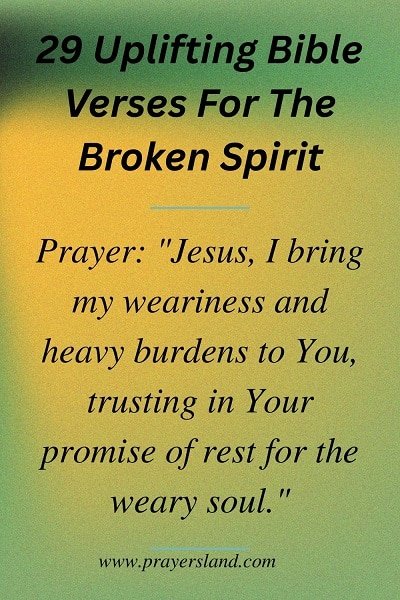In the quiet moments when life feels overwhelming and your heart carries burdens too heavy to bear alone, God’s Word becomes a sanctuary of hope. There’s something profoundly healing about discovering that the 29 Uplifting Bible Verses For The Broken Spirit you’re experiencing has been understood and addressed by Jesus Christ throughout Scripture for thousands of years.
I remember sitting with Sarah, a friend who had just lost her job and was questioning everything about her future. As we opened her worn Bible to Psalm 34:18, something shifted in her countenance. “The LORD is close to the brokenhearted and saves those who are crushed in spirit.” It wasn’t just words on a page it was a divine whisper of comfort that reminded her she wasn’t walking through this valley alone.
When our spirits feel fractured by life’s storms whether through loss, disappointment, illness, or unexpected challenges biblical hope becomes our lifeline. The Scriptures don’t promise us a life without trials, but they offer something far more valuable: God’s promises of His constant presence, healing, and restoration.
In this article, you’ll discover 29 carefully selected Bible verses for healing emotional pain that speak directly to the weary soul. These aren’t just ancient texts, but living words that offer Christ-centered comfort, practical faith for your daily struggles, and gentle reminders of God’s faithfulness even in your darkest moments.
Finding Comfort in God’s Presence(Bible Verses For The Broken Spirit)

When despair threatens to overwhelm us, the first place we can turn is to the assurance of God’s unchanging presence in our lives.
1. Psalm 34:18
“The LORD is close to the brokenhearted and saves those who are crushed in spirit.”
Prayer: “Heavenly Father, when my heart feels shattered and my spirit crushed, remind me that You draw near to me in my pain.”
This verse from Psalms reveals God’s compassion for those experiencing emotional healing needs. The Hebrew word “close” implies intimate nearness—not distant sympathy, but personal, tender presence during our affliction.
2. Isaiah 41:10
“So do not fear, for I am with you; do not be dismayed, for I am your God. I will strengthen you and help you; I will uphold you with my righteous right hand.”
Prayer: “Lord, replace my fear with confidence in Your strength, knowing You hold me securely in Your righteous hand.”
Isaiah presents a threefold promise from God: His presence eliminates fear, His identity as our God removes dismay, and His strength becomes our foundation when we feel weak.
3. Matthew 11:28
“Come to me, all you who are weary and burdened, and I will give you rest.”
Prayer: “Jesus, I bring my weariness and heavy burdens to You, trusting in Your promise of rest for the weary soul.”
Jesus Christ’s invitation in Matthew isn’t conditional on our performance or worthiness. The word “rest” here implies complete renewal physical, emotional, and spiritual restoration for the exhausted heart.
4. Psalm 147:3
“He heals the brokenhearted and binds up their wounds.”
Prayer: “Great Physician, heal the broken places in my heart and bind up every wound with Your gentle touch.”
This Psalm uses medical imagery to describe God’s healing work. “Binds up” suggests careful, skilled attention to our emotional healing like a physician tenderly caring for physical injuries.
5. 2 Corinthians 1:3-4
“Praise be to the God and Father of our Lord Jesus Christ, the Father of compassion and the God of all comfort, who comforts us in all our troubles.”
Prayer: “Father of compassion, thank You for being my source of comfort in every trouble I face.”
Paul in 2 Corinthians identifies God by His essential character: compassion and comfort. The Greek word for comfort means “called alongside” God doesn’t comfort from a distance but walks intimately through our struggles.
Strength for the Weary Soul

When life drains our energy and we feel too weak to continue, God’s Word offers supernatural strength and courage for each step forward.
6. Isaiah 40:31
“But those who hope in the LORD will renew their strength. They will soar on wings like eagles; they will run and not grow weary, they will walk and not be faint.”
Prayer: “Lord, renew my strength as I place my hope entirely in You, trusting Your power to sustain me.”
Isaiah describes three levels of strength: soaring (extraordinary moments), running (active service), and walking (daily faithfulness). God’s renewal meets us wherever we are in our spiritual journey.
7. Philippians 4:13
“I can do all this through him who gives me strength.”
Prayer: “Christ, remind me that my limitations don’t define me Your strength working through me does.”
Paul’s declaration in Philippians isn’t about personal achievement but about Christ’s enabling power. The context shows this strength especially applies to contentment and perseverance through difficult circumstances.
8. Joshua 1:9
“Have I not commanded you? Be strong and courageous. Do not be afraid; do not be discouraged, for the LORD your God will be with you wherever you go.”
Prayer: “God, grant me courage to face each day, knowing You accompany me wherever I go.”
God’s command to Joshua combines strength and courage with His promise of presence. The repetition emphasizes that courage isn’t the absence of fear but action despite fear, sustained by divine presence.
9. 2 Corinthians 4:16-18
“Therefore we do not lose heart. Though outwardly we are wasting away, yet inwardly we are being renewed day by day.”
Prayer: “Holy Spirit, renew my inner renewal daily, even when external circumstances remain challenging.”
Paul contrasts outer decay with inner renewal. This 2 Corinthians passage reminds us that spiritual wholeness can flourish even when physical or emotional circumstances remain difficult.
10. Romans 8:28
“And we know that in all things God works for the good of those who love him, who have been called according to his purpose.”
Prayer: “Sovereign Lord, help me trust that You’re weaving even painful circumstances into Your good purpose.”
Romans doesn’t promise all things are good, but that God works within all circumstances for ultimate good. This requires faith that sees beyond immediate pain to God’s larger redemptive plan.
Peace That Surpasses Understanding

In a world filled with anxiety and worry, God offers a supernatural peace that transcends our circumstances and human comprehension.
11. John 14:27
“Peace I leave with you; my peace I give you. I do not give to you as the world gives. Do not let your hearts be troubled and do not be afraid.”
Prayer: “Jesus, fill my heart with Your divine peace that the world cannot give or take away.”
Jesus’ promise in John distinguishes His peace from worldly substitutes. His peace isn’t dependent on circumstances but flows from relationship with Him and trust in God’s sovereign control.
12. Philippians 4:6-7
“Do not be anxious about anything, but in every situation, by prayer and petition, with thanksgiving, present your requests to God. And the peace of God, which transcends all understanding, will guard your hearts and your minds in Christ Jesus.”
Prayer: “Lord, I exchange my anxiety for Your peace, presenting every worry to You with thanksgiving.”
Paul’s formula in Philippians for overcoming anxiety includes three elements: prayer and petition (asking), thanksgiving (gratitude), and trust (releasing control). The result is peace that surpasses understanding.
13. Psalm 55:22
“Cast your cares on the LORD and he will sustain you; he will never let the righteous be shaken.”
Prayer: “Faithful God, I cast every burden and care upon You, trusting Your promise to sustain me.”
This Psalm uses imagery of throwing or hurling our burdens onto God. “Sustain” implies ongoing support not just momentary relief but continued strength for whatever lies ahead.
14. 1 Peter 5:7
“Cast all your anxiety on him because he cares for you.”
Prayer: “Caring Father, I release my anxiety to You, resting in Your personal love and concern for me.”
Peter’s instruction in 1 Peter emphasizes the motivation for casting burdens: God’s genuine care. The Greek word for “cares” suggests active, ongoing concern like a parent’s attentive love.
15. Isaiah 43:2
“When you pass through the waters, I will be with you; and when you pass through the rivers, they will not sweep over you. When you walk through the fire, you will not be burned; the flames will not set you ablaze.”
Prayer: “Emmanuel, be my companion through every flood and fire, protecting me by Your faithful presence.”
Isaiah’s promise doesn’t eliminate trials but guarantees God’s presence within them. Water and fire represent overwhelming circumstances, yet God’s presence transforms potential destruction into opportunities for experiencing His protection.
Hope and Restoration
Even in our darkest valleys, God plants seeds of hope and promises restoration that can transform our broken spirit into a testimony of His grace.
16. Psalm 30:5
“For his anger lasts only a moment, but his favor lasts a lifetime; weeping may stay for the night, but rejoicing comes in the morning.”
Prayer: “God of hope, remind me that my current sorrow is temporary—joy will dawn again in Your timing.”
This Psalm contrasts the temporary nature of grief with the enduring quality of God’s favor. The imagery of night and morning suggests natural rhythm sorrow has its season, but joy inevitably follows.
17. Lamentations 3:22-23
“Because of the LORD’s great love we are not consumed, for his compassions never fail. They are new every morning; great is your faithfulness.”
Prayer: “Faithful Lord, thank You that Your compassion renews with each sunrise, offering fresh hope daily.”
Written during Jerusalem’s darkest hour, Lamentations declares God’s faithfulness even in devastation. “New every morning” suggests daily renewal of compassion fresh mercy for each day’s struggles.
18. Romans 15:13
“May the God of hope fill you with all joy and peace as you trust in him, so that you may overflow with hope by the power of the Holy Spirit.”
Prayer: “God of hope, fill me with joy and peace through trust, until hope overflows from my life.”
Paul’s blessing in Romans identifies God as the source of hope. The progression moves from trust to joy and peace, culminating in overflowing hope empowered by the Holy Spirit.
19. Jeremiah 29:11
“‘For I know the plans I have for you,’ declares the LORD, ‘plans to prosper you and not to harm you, to give you hope and a future.'”
Prayer: “Lord, when I cannot see the path ahead, I trust in Your good plans for my future.”
God’s declaration through Jeremiah addresses our deepest fears about the future. His plans are characterized by prosperity (wholeness), protection from harm, hope, and future promise.
20. Psalm 30:11
“You turned my wailing into dancing; you removed my sackcloth and clothed me with joy.”
Prayer: “Redeemer, transform my grief into joy, replacing sorrow’s garments with celebration of Your goodness.”
The Psalm uses clothing imagery to describe God’s transformative work. Sackcloth (mourning clothes) gives way to garments of joy—a complete wardrobe change reflecting inner restoration.
Trust in God’s Perfect Timing
Learning to trust God’s plan and timing becomes essential for maintaining faith when circumstances don’t align with our expectations or desires.
21. Proverbs 3:5-6
“Trust in the LORD with all your heart and lean not on your own understanding; in all your ways submit to him, and he will make your paths straight.”
Prayer: “Wise God, I choose to trust You completely rather than leaning on my own understanding of circumstances.”
Proverbs contrasts total trust with partial reliance on human wisdom. “All your heart” and “all your ways” emphasize complete surrender, while “straight paths” promises God’s guidance despite confusing circumstances.
22. Romans 12:12
“Be joyful in hope, patient in affliction, faithful in prayer.”
Prayer: “Lord, grant me joy in hope, patience in affliction, and faithfulness in prayer during this season.”
Paul’s three-part instruction in Romans creates a rhythm for difficult seasons: hope generates joy, affliction develops patience, and prayer maintains faith each supporting the others.
23. Matthew 6:34
“Therefore do not worry about tomorrow, for tomorrow will worry about itself. Each day has enough trouble of its own.”
Prayer: “Prince of Peace, help me focus on today’s grace rather than borrowing worry from tomorrow.”
Jesus’ teaching in Matthew advocates present-focused living. The phrase “enough trouble” acknowledges daily challenges while discouraging the multiplication of anxiety through future-focused worry.
24. Psalm 42:11
“Why, my soul, are you downcast? Why so disturbed within me? Put your hope in God, for I will yet praise him, my Savior and my God.”
Prayer: “Lord, when my soul feels downcast, remind me to redirect my hope toward You, my Savior.”
The psalmist’s self-dialogue in Psalm 42 models healthy internal conversation during discouragement. The progression moves from questioning emotions to redirecting hope and anticipating future praise.
25. Psalm 23:4
“Even though I walk through the darkest valley, I will fear no evil, for you are with me; your rod and your staff, they comfort me.”
Prayer: “Good Shepherd, in life’s darkest valleys, let Your presence replace my fear with confident trust.”
This beloved Psalm transforms the metaphor of dangerous valleys into places of divine presence. The shepherd’s tools become sources of comfort rather than discipline, emphasizing protection and guidance.
God’s Eternal Promises
Understanding God’s unchanging character and eternal promises provides an anchor for our souls when everything else feels unstable or uncertain.
26. Matthew 5:4
“Blessed are those who mourn, for they will be comforted.”
Prayer: “Comforting God, in my grief and mourning, let me experience the blessing of Your divine comfort.”
Jesus’ beatitude in Matthew doesn’t minimize grief but promises comfort for those who mourn. The passive voice suggests God as the source of comfort we receive what He provides.
27. Revelation 21:4
“‘He will wipe every tear from their eyes. There will be no more death or mourning or crying or pain, for the old order of things has passed away.'”
Prayer: “Eternal God, in present pain I cling to Your promise of ultimate healing and restoration.”
John’s vision in Revelation provides ultimate perspective on current suffering. God’s personal action of wiping tears emphasizes intimate care, while the elimination of pain promises complete redemption.
28. Psalm 126:5-6
“Those who sow with tears will reap with songs of joy. Those who go out weeping, carrying seed to sow, will return with songs of joy, carrying sheaves with them.”
Prayer: “Lord of the harvest, let my tears become seeds of joy, trusting Your promise of abundant blessing.”
This Psalm uses agricultural imagery to describe God’s redemption of sorrow. Tears become seeds that produce joy—current pain contains potential for future celebration through God’s transformative work.
29. 2 Corinthians 5:17
“Therefore, if anyone is in Christ, the new creation has come: The old has gone, the new is here!”
Prayer: “Creator God, thank You that in Christ I am a new creation my broken spirit is being made whole.”
Paul’s declaration in 2 Corinthians announces present reality, not future possibility. “Has come” and “is here” indicate completed action spiritual wholeness is our current identity in Christ, regardless of circumstances.
Conclusion: Walking in Daily Renewal
These 29 uplifting Bible verses aren’t merely comforting words to read during crisis—they’re God’s promises designed to transform how we approach each day with renewed strength and hope. When your broken spirit feels too heavy to carry alone, remember that Jesus Christ specializes in healing emotional pain and bringing restoration to the most damaged places of our hearts.
Making Scripture Personal and Transformative:
Start each morning by selecting one verse that speaks to your current situation. Write it on a card, set it as your phone wallpaper, or repeat it as a prayer throughout the day. The goal isn’t memorization but internalization allowing God’s Word to become the soundtrack of your thoughts rather than anxiety or fear.
Create a prayer journal where you respond to each verse personally. Write down your worries, fears, and hopes, then read these verses as God’s direct response to your heart. This practice transforms Scripture from ancient text into personal conversation with your Heavenly Father.
Share these verses with others walking through trials. Often, comforting others through faith becomes the pathway to our own healing. When we speak biblical hope into someone else’s situation, we reinforce God’s promises in our own hearts.
Your Journey of Faith Continues:
Which of these verses resonated most deeply with your current circumstances? Consider spending a week meditating on that particular passage, asking God to reveal new layers of comfort and strength within it.
I encourage you to keep this collection of verses easily accessible bookmark this article, print key verses, or create your own handwritten collection. In moments when despair threatens to overwhelm your faith, these scriptures for brokenness can become lifelines that reconnect you to God’s unchanging love.
Remember, healing isn’t always instant, but it’s always certain when we place our trust in the God who “makes all things new.” Your broken spirit is not your final destination it’s the beginning of a beautiful story of redemption that only God can write.
What step will you take today to let these verses transform your perspective on your current challenges? Your journey toward spiritual wholeness matters, and God is faithful to complete the good work He has begun in you.
For more visit: https://prayersland.com/

Noah James is the author behind PrayersLand, a blog dedicated to inspiring faith, hope, and spiritual growth. With a deep passion for prayer and devotion, he shares heartfelt reflections, powerful prayers, and uplifting insights to strengthen believers on their spiritual journey. His writings aim to bring comfort, wisdom, and divine connection.

